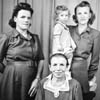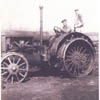Kerbes Family
 The Kerbes family's genealogical heritage can be traced to Peter Ristininna (1742-1806), the first documented ancestor of the Kerbes family. The name Ristininna can be analyzed in two parts. Risti refers to the local Estonian Lutheran parish while Ninna refers to the local area where Peter worked.
The Kerbes family's genealogical heritage can be traced to Peter Ristininna (1742-1806), the first documented ancestor of the Kerbes family. The name Ristininna can be analyzed in two parts. Risti refers to the local Estonian Lutheran parish while Ninna refers to the local area where Peter worked.
At various times during the 19th century, peasants were granted last names as a result of the abolition of serfdom. On 1 April 1835, the German landlord Eduard Zur Muhlen assigned the surname Kärbes to Mikhel, son of Peter Ristininna. On 26 April 1835, Mikhel's wife Madli was given the Karbes name by the Russians so that they could keep a more accurate record of the people. Lord Zur Muhlen fell in love with the Kerbes' daughter, Madli. They two soon had two children, Mikhel (b. 1834) and Thomas (b. 1846). Madli's oldest son Mikhel married a woman named Lissu Walli and together they had eight children, several of whom immigrated to Canada in the years to follow. Of interest, the Estonian name Kärbes was anglicized and changed to Kerbes as the umlaut.
In 1884, Mikhel, Lissu and their children moved to undeveloped land near Tver, Russia. Once the land had been cleared, planting and harvesting began. Wild animals were a perennial threat to livestock. This was a serious issue for farmers as their livestock inventory was rather sparse. On one occasion, a bear killed the family cow, much to the family's great chagrin. Peter, the oldest son, responded to the emergency by tracking down the bear. Unsuccessful in killing it however, Peter, emulating the courage of the Estonian mythological character Kalevipoeg, forced his hand down the bear's throat and waited for a neighbour to arrive and kill the beast.
 At the close of the 19th century, Russian conscription was a contentious issue that worried the Kerbes family. The Kerbes youngest son Johannes desperately wanted to avoid being conscripted into the Russian Army and immigrated to Canada in 1903. Having set up a farm near Stettler, he eventually married Sophie Wartnow. She died tragically in 1918 and Johannes married his sister, Minnie.
At the close of the 19th century, Russian conscription was a contentious issue that worried the Kerbes family. The Kerbes youngest son Johannes desperately wanted to avoid being conscripted into the Russian Army and immigrated to Canada in 1903. Having set up a farm near Stettler, he eventually married Sophie Wartnow. She died tragically in 1918 and Johannes married his sister, Minnie.
Johannes' sister Mari married Joseph Hennel and they settled in the Stettler area in 1903. Six years later, Jaan, accompanied by his wife, their three children and Jaan's mother, travelled across the Atlantic and farmed in the vicinity of his siblings. The Kerbes family often wrote to Peter and Julia asking them to move to Alberta. In 1911, Peter Kerbes accepted the offer and arrived with his family.








